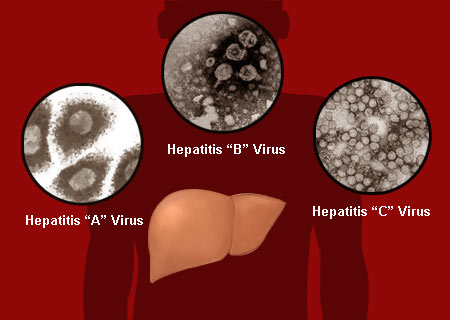
What is Hepatitis?
What is Hepatitis?
Hepatitis refers to an inflammation of the liver cells and damage to the liver. There are different types and causes, but the symptoms can be similar.
The liver's functions include detoxifying the blood, storing vitamins, and producing hormones. Hepatitis can disrupt these processes and create severe health problems throughout the body.
At least five viruses can cause hepatitis. The three most common are hepatitis viruses A, B and C. Infection with any of these three can be fatal.
Other types of hepatitis can result from overconsumption of alcohol or an autoimmune condition. This article will look at hepatitis A, B, and C. These are forms of hepatitis transmitted by a virus.
In the United States, the incidence of hepatitis A has been falling for the last 20 years, but acute hepatitis C has seen an increase of 44 percent between 2011 and 2012.
Types
Hepatitis has several different types, but the symptoms of each are similar. Hepatitis can take acute and chronic forms.
The three main types of hepatitis are known as hepatitis A, B, and C. Each is caused by a different virus. All three types can be acute, lasting for 6 months or less, and types B and C can be chronic, lasting for longer.
Each type has different characteristics and is transmitted in different ways, but symptoms tend to be similar.
Hepatitis A
In the United States (U.S.), 1,390 cases of hepatitis A were reported in 2015.
It is often mild, and most people make a full recovery, after which they are immune and therefore protected from the virus in the future. However, if it progresses, symptoms can be severe or life-threatening.
People in parts of the world with poor sanitation are particularly at risk of contracting HAV.
There are safe and effective vaccines that protect against this virus.
Hepatitis B
Hepatitis B can be transmitted when a person:
has unprotected sexual intercourse with an infected person
shares a needle with an infected person, often for illegal drug or steroid use
has a tattoo created with unsterilized needles
is accidentally pricked, for example, health workers dealing with sharp objects
shares personal items, such as a toothbrush or razor, with an infected person
is bitten by someone who is infected
An infected mother can pass the virus on to her infant when breast-feeding.
The liver of a person infected with hepatitis B swells. Severe damage can result.
HBV infection can become chronic. This can lead to complications, including scarring of the liver, or cirrhosis. It can also cause a type of cancer known as hepatocellular carcinoma.
In 2015, 887,000 deaths worldwide were linked to HBV, mostly as a result of complications such as these.
In the U.S., there were 3,370 reported cases of HBV, but the Centers for Disease Control and Prevention (CDC) estimate that the real figure may be around 21,900.
There is not currently a cure for HBV. However, the incidence rate has dropped in countries where the vaccine is available, and this vaccine is 95 percent effective against the infection.
There is a safe and effective vaccine that can protect against HBV.
Hepatitis C
HCV can lead to liver damage and swelling. Around 1 in 4 people with HCV get cirrhosis, and this can lead to liver cancer.
Donated blood is now tested for HCV, but people who received organ transplants or blood donations before testing became part of the donation process may be at risk.
Other at-risk groups include healthcare workers who are exposed to sharps, users of intravenous drugs, and infants born to mothers with HCV.
The number of cases of HCV in the U.S. rose nearly threefold between 2010 and 2015 when 2,436 cases were reported. However, the CDC estimate that 33,900 infections occurred in 2015, including those not reported.There is no vaccine to prevent HCV, but treatment can cure it.
Treatment
Some types and cases of hepatitis can heal without intervention, but sometimes it can progress to scarring of the liver, or cirrhosis.
Hepatitis A
There is no specific treatment for HAV. The doctor will advise the patient to abstain from alcohol and drugs during the recovery. Most patients with hepatitis A will recover without intervention.
Hepatitis B
A patient with HBV needs to rest and abstain completely from alcohol. The doctor may prescribe an antiviral agent called interferon, or other antiviral suppressive therapies.
Hepatitis C
A patient with hepatitis C will be prescribed antiviral agents, with or without ribavirin.
Some directed antivirals and combination therapies are now available to treat the hepatitis C virus based on its subtype. These treatments target viral replication and prevent the virus from being able to reproduce. When taken correctly, the cure rate is very high.
These medications can be expensive, and insurers may have specific criteria for treatment.
Symptoms
Many people with hepatitis experience either mild or no symptoms. When symptoms appear, they can do so from 15 to 180 days after infection. This applies to all types of hepatitis.
Acute hepatitis
The initial phase of hepatitis is called the acute phase. The symptoms are similar to mild flu, and may include:
diarrhea
fatigue
loss of appetite
mild fever
muscle or joint aches
nausea
slight abdominal pain
vomiting
weight loss
jaundice
The acute phase is not usually dangerous, but in certain people, it can result in acute liver failure and death. It may also progress to a chronic infection. This is most likely with HBV or HCV.
As the disease progresses, chronic hepatitis can lead to progressive liver failure, resulting in jaundice, swelling of the lower extremities, confusion, and blood in the feces or vomit.
The following may occur:
dark urine
hives
itchy skin
light-colored feces
yellow skin, whites of the eyes, and tongue
Patient outcomes after the acute phase depend on various factors, especially the type of hepatitis. Some people will not know they have chronic hepatitis until liver failure occurs.
Diagnosis
As the symptoms of the different types of hepatitis are similar, the type and severity of hepatitis may only be diagnosed through laboratory tests.
A doctor will perform a physical examination and ask for a medical history to assess whether a patient has been exposed to a likely cause of hepatitis.
If a patient recently traveled abroad, they may have HAV. If they have had unprotected sex, they may have HBV.
If hepatitis is suspected, the following tests can confirm a diagnosis:
Blood tests: These can detect whether the body is producing antibodies to fight the disease, and they can assess liver function by checking the levels of certain liver proteins and enzymes.
Nucleic acid tests: For hepatitis B and C, an HBV DNA or HCV RNA test can confirm the speed at which the virus is reproducing in the liver, and this will show how active the disease is.
A liver biopsy: This can measure the extent of liver damage and the possibility of cancer.
Paracentesis: Abdominal fluid is extracted and tested, to identify the cause of fluid accumulation.
Elastography: This measures the liver's stiffness by emitting sound waves.
Surrogate markers: A type of blood test to assess the development of cirrhosis and fibrosis.
Treatment will depend on the diagnosis.
Causes
The three most common types of viral hepatitis are all caused by viral infections.
Hepatitis A is caused by consuming food or water infected with the hepatitis A virus (HAV), often while traveling abroad. The virus can also be transmitted through anal-oral contact during sex or by injecting drugs.
Hepatitis B is caused by the hepatitis B virus (HBV) and is spread through contact with infected blood, semen, and some other body fluids. It can be a sexually transmitted disease (STD).
Hepatitis C mostly results from percutaneous infection, occurring when the HCV virus gets under the skin. It is usually spread through injected narcotics, needle-stick injuries, and a lack of infection control in healthcare settings.
HCV cannot be caught from contact with feces, and sexual transmission is less common than in other types.
Alcohol, medicines, obesity, and chemical exposure do not cause types A, B, or C, but they may aggravate inflammation and make symptoms worse.
Prevention
Hepatitis can be dangerous and difficult to treat, so people are advised to take precautions against possible infection.
Preventing hepatitis A
Hepatitis A is mostly spread through infected food and water.
The following steps can help avoid infection, especially when traveling.
Wash hands with soap after using the bathroom.
Only consume food that has just been cooked.
Only drink commercially bottled water, or boiled water if you're unsure of local sanitation.
Only eat peelable fruits if you are in a location with unreliable sanitation
Only eat raw vegetables if you are sure they have been cleaned or disinfected thoroughly.
Get a vaccine for HAV before traveling to places where hepatitis may be endemic.
Preventing hepatitis B
To minimize the risk of transmission:
Tell any sex partner if you are a carrier or try to find out if they carry the disease.
Practice safe sex using condoms.
Only use previously unused, clean needles.
Do not share toothbrushes, razors, or manicure instruments.
Only allow the use of well-sterilized skin perforating equipment, such as during a tattoo, piercing, or acupuncture.
Have the HBV vaccination if you are at risk.
How to prevent hepatitis C
As this is often passed on through the transfer of infected bodily fluids, the following steps can help prevent HCV transmission:
Do not share needles, toothbrushes, or manicure equipment.
Make sure equipment is well-sterilized for any skin piercing.
Consume alcohol with moderation.
Do not inject illegal drugs.
Hepatitis A and C are curable, but hepatitis B is only preventable by vaccine. A cure is still under development.
Outlook
The different types of hepatitis have different chances of recovery.
Hepatitis A: This type of hepatitis will normally resolve in 2 months without leaving any long-term effects. A person with HAV will usually be immune to hepatitis A for the rest of their life.
Hepatitis B: Most adults infected with the HBV virus recover within 90 days and achieve lifelong immunity. However, 90 percent of infants, 20 percent of older children, and 5 percent of adults will develop a chronic infection and develop severe health problems, such as liver cancer and cirrhosis.
Hepatitis C: This becomes a lifelong infection in 70 to 85 percent of people that have the HCV virus. Hepatitis C is fatal in between 1 and 5 percent of people. The infection can now be cured, and 15 to 25 percent of people with HCV clear the infection without treatment.
Related Posts
The Drug Costs $95K. Its Maker 'Dodged' $10B in Taxes
A pharmaceutical company that has in recent years made billions of dollars on hepatitis C treatments—the three the FDA has approved range from $75,000 to $94,500—has been named a “price gouger” and “tax dodger” in a new report. Gilead Sciences, the sixth richest drugmaker in the world, “is making a fortune selling essential drugs to…
FDA approves first pill to treat all forms of hepatitis C
Federal health officials on Tuesday approved the first pill to treat all major forms of hepatitis C, the latest in a series of drug approvals that have reshaped treatment of the liver-destroying virus. The Food and Drug Administration approved the combination pill, Epclusa, from Gilead Sciences, for patients with and without liver damage. The new…
Zepatier Hepatitis C Drug From Merck Is Approved
By REUTERSJAN. 29, 2016 United States regulators on Thursday approved a new once-daily pill for the liver-destroying hepatitis C virus made by Merck, which said it would sell the drug at a lower list price than its competitors. The list price for Zepatier will be $54,600 for a 12-week regimen, which Merck said it expected…
Another study confirms detrimental effects of delaying hepatitis C treatment
Another study confirms detrimental effects of delaying hepatitis C treatment Liz Highleyman Produced in collaboration with hivandhepatitis.com Published: 05 May 2015 Deferring antiviral therapy for hepatitis C until a person progresses to advanced liver disease has clear drawbacks including lower treatment effectiveness and an increased risk of clinical events and death, according to a study…
Newest Hepatitis C Drug Without Interferon Achieves 93 Percent Cure Rate
Newest Hepatitis C Drug Without Interferon Achieves 93 Percent Cure Rate
FAQs about Alcoholic Liver Disease
FAQs about Alcoholic Liver Disease What is alcoholic liver disease (ALD)? ALDis the development of liver damage as a result of heavy alcohol consumption. This damage may occur in three patterns: fatty liver (an abnormal accumulation of fat in the structural cells of the liver), alcoholic hepatitis (inflammation of the liver caused by…
Harvoni Is Here: The Once-a-Day, Single Hep C Pill
Interferon-free and ribavirin-free treatment has finally arrived, but someone has to pay for this miracle Hepatitis C pill. The Hepatitis C community has been waiting a long time for a miracle – and Harvoni nearly fits the bill. Approved on October 10, 2014, Harvoni became the first Hepatitis C drug approved by the U.S. Food…
Hepatitis C Epidemic in Africa
Hepatitis C Epidemic in Africa The epidemic levels of Hepatitis C virus (HCV) prevalence in Africa is considered one of the most serious health challenges facing African nations by the World Health Organization (WHO). According to Dr. Peter Beyer, Essential Medicines Advisor at WHO, the greatest challenges to fighting HCV in Africa are drug access…
7 Ways Hepatitis C Affects Women Differently than Men
7 Ways Hepatitis C Affects Women Differently than Men Although the virus itself does not discriminate against gender, these seven differences between men and women with Hepatitis C are worth reviewing. First discovered as a contagious virus in 1989, Hepatitis C currently infects an estimated four million Americans. While this highly transmissible virus does not…








